
M.L.A. is a 1957 Indian Telugu-language sociopolitical film directed and produced by K. B. Tilak.
Madhavapeddi Satyam was an Indian playback singer and actor who predominantly worked in Telugu cinema.
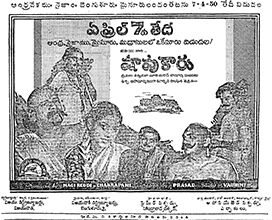
Shavukaru (transl. Businessman) is a 1950 Indian Telugu-language drama film directed by L. V. Prasad. The film was produced by Nagireddy and Chakrapani under the Vijaya Productions banner as their maiden production. It stars N. T. Rama Rao in his first leading role after having a brief appearance as a police officer in the film Mana Desam (1949), along with debutant Janaki too in her first leading role. The music composed by Ghantasala.
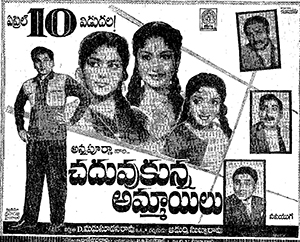
Chaduvukunna Ammayilu is a 1963 Indian Telugu-language drama film directed by Adurthi Subba Rao. It stars Akkineni Nageswara Rao, Savitri, Krishna Kumari with music composed by S. Rajeswara Rao. It was produced by D. Madhusudhana Rao under the Annapurna Pictures banner. The film is based on the Telugu novel Kaalaatheetha Vyakthulu, written by Dr. Sridevi. The film was recorded as a Super Hit at the box office.

Thodi Kodallu (transl. Sisters-in-law) is a 1957 Indian Telugu-language drama film directed and edited by Adurthi Subba Rao who co-wrote the script with D. Madhusudhana Rao and Acharya Aatreya. Madhusudhana Rao produced the film under Annapurna Pictures. It stars Akkineni Nageswara Rao and Savitri with music composed by Master Venu. The film is based on Sarat Chandra Chattopadhyay's Bengali novel Nishkriti, and was simultaneously made as the Tamil film Engal Veettu Mahalakshmi (1957); both films were made simultaneously by the same banner and director, and some of the scenes and artists are the same in both versions. Thodi Kodallu won the Certificate of merit for Best Feature Film in Telugu.
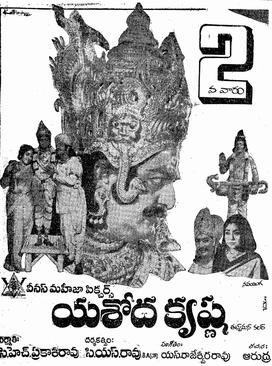
Yashoda Krishna is a 1975 Indian Telugu-language film, directed by C. S. Rao. Baby Sridevi and Baby Rohini acted as Bala Krishna and Ramakrishna as Lord Krishna, which also marked actress Rohini Molleti's on-screen debut as a child artiste. Jamuna as Yashoda and S. V. Ranga Rao as Kamsa. The film was later dubbed into Kannada of the same name. The film is also remembered for the final appearance of the great actor, S. V. Rangarao, as his previous last Tamil film Sivakamiyin Selvan (1974) got released a couple of months earlier.
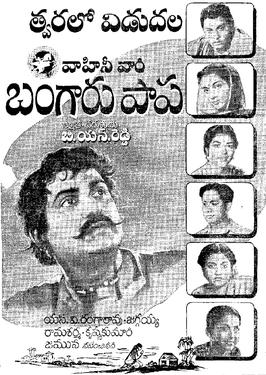
Bangaru Papa is a 1955 Indian Telugu-language film produced and directed by B. N. Reddy on Vauhini Productions banner. The film stars S. V. Ranga Rao, Jaggayya, Krishna Kumari, Jamuna. It is based on the 1861 English novel Silas Marner by George Eliot.

Edi Nijam is a 1956 Indian Telugu-language film directed by Vainik and film personality S. Balachander and produced by Ghantasala Krishnamurthy of Pratibha Films. The films starring Nagabhushanam of Rakta Kanneeru fame. The story is loosely based on the Italian film Puzitor. The film was dubbed into Tamil as Edhu Nijam (1956).
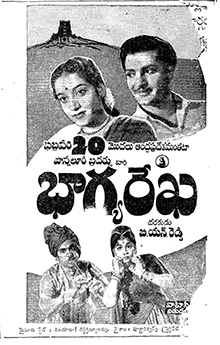
Bhagya Rekha (transl. Fortunes) is a 1957 Indian Telugu-language drama film, produced by Ponnaluri Brothers under the Ponnaluri Brothers Pvt. Ltd. banner and directed by B. N. Reddy. It stars N. T. Rama Rao, Jamuna and music composed by Pendyala Nageswara Rao. The film was dubbed into Tamil as Veettukku Vandha Varalakshmi (1958).
Sati Anasuya is a story that has been made into many Indian films in different languages. It has been made into the Telugu language in 1935, 1936, 1957 and 1971.
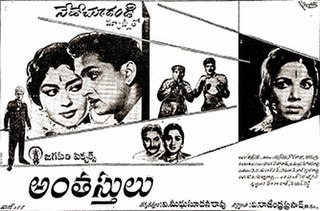
Antastulu (transl. classes) is a 1965 Indian Telugu-language drama film produced by V. B. Rajendra Prasad and directed by V. Madhusudhana Rao. It stars Akkineni Nageswara Rao, Bhanumathi Ramakrishna, Krishna Kumari with music composed by K. V. Mahadevan. The film won the National Film Award for Best Feature Film in Telugu in 1965. The film won two Nandi Awards.

Aatma Gowravam (transl. Self-esteem) is a 1966 Indian Telugu-language drama film directed by K. Viswanath. It stars Akkineni Nageswara Rao, Kanchana, Rajasree, and music composed by S. Rajeswara Rao. It is produced by D. Madhusudhana Rao under Annapurna Pictures banner.

Chitti Tammudu is a 1962 Telugu drama film directed by K. B. Tilak.

C. I. D. is a 1965 Indian Telugu-language action film, produced by Nagireddy-Chakrapani under the Vijaya Productions banner and directed by Tapi Chanakya. The film stars N. T. Rama Rao and Jamuna, with the music composed by Ghantasala. The film is a remake of the Tamil movie Dheiva Thaai (1964).

Sampoorna Ramayanam is a 1972 Indian Telugu-language Hindu mythological film directed by Bapu. It is based on Valmiki's Ramayana. The film was a commercial success.

Pooja Phalam is a 1964 Indian Telugu-language drama film directed and co-written by B. N. Reddy. It stars Akkineni Nageswara Rao, Savitri and Jamuna, with music composed by S. Rajeswara Rao. The film is based on the novel Poojari, written by Munipalle Raju.

Mangalya Balam is a 1959 Indian Telugu-language romantic drama film, produced by D. Madhusudhana Rao under Annapurna Pictures banner and directed by Adurthi Subba Rao. It stars Akkineni Nageswara Rao and Savitri, with music composed by Master Venu. The film is a remake of the Bengali film Agni Pariksha, which was based on Ashapurna Devi's novel of the same name. It was simultaneously made by the same banner and director in Tamil as Manjal Mahimai.

Veera Kankanam is a 1957 Telugu-language swashbuckler film, produced by T. R. Sundaram under the Modern Theatres banner and directed by G. R. Rao. It stars N. T. Rama Rao, Krishna Kumari, Jamuna and music composed by Susarla Dakshinamurthi. The film is a remake of the 1950 Tamil Historical fiction film Manthiri Kumari.

Eedu Jodu (transl. Lovematch) is a 1963 Indian Telugu-language film produced and directed by K. B. Tilak. The film stars Jaggayya, Jamuna, Gummadi, Chalam and Manimala. It was released on 17 May 1963 and became a commercial success. The director remade the film in Hindi in 1971 as Kangan.
















